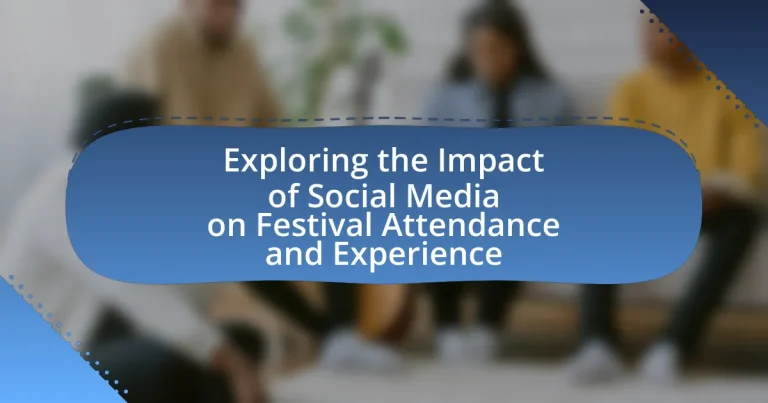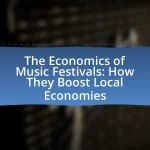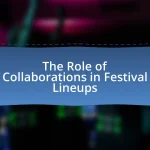The article examines the significant impact of social media on festival attendance and experience, highlighting how platforms like Facebook, Instagram, and Twitter enhance visibility and engagement for events. It discusses the influence of social media on attendees’ decisions to participate, the role of user-generated content in shaping perceptions, and the psychological effects on festival-goers. Additionally, the article addresses the challenges posed by social media, including misinformation and privacy concerns, while offering strategies for festival organizers to effectively leverage social media to improve attendance and enhance the overall experience.
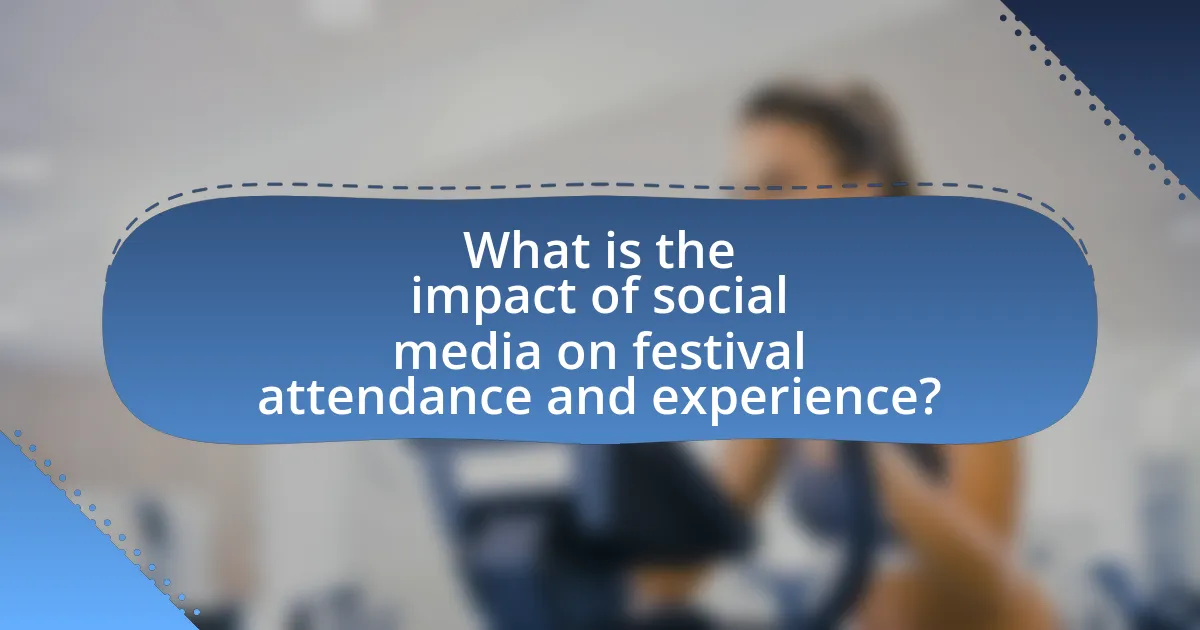
What is the impact of social media on festival attendance and experience?
Social media significantly enhances festival attendance and experience by increasing visibility and engagement. Platforms like Facebook, Instagram, and Twitter allow festival organizers to promote events, share real-time updates, and engage with attendees, leading to higher ticket sales and participation. For instance, a study by Eventbrite found that 93% of event organizers believe social media is crucial for driving attendance, as it enables targeted marketing and fosters community among potential attendees. Additionally, social media enhances the festival experience by allowing attendees to share their experiences, connect with others, and access live updates, which can improve overall satisfaction and engagement during the event.
How does social media influence the decision to attend festivals?
Social media significantly influences the decision to attend festivals by shaping perceptions and providing real-time information. Platforms like Instagram and Facebook allow users to see live updates, photos, and videos from past events, which can create excitement and a sense of community. According to a study published in the Journal of Marketing Research, 79% of festival-goers reported that social media content influenced their decision to attend an event. This influence is further amplified by user-generated content, as individuals often trust peer recommendations over traditional advertising, leading to increased attendance based on shared experiences and social validation.
What role do social media platforms play in promoting festivals?
Social media platforms play a crucial role in promoting festivals by providing a wide-reaching and interactive space for event marketing. These platforms enable festival organizers to share information, engage with potential attendees, and create buzz around events through targeted advertising and organic content. For instance, a study by Eventbrite found that 93% of event creators use social media to promote their events, highlighting its effectiveness in reaching diverse audiences. Additionally, social media allows for real-time updates and user-generated content, which can enhance visibility and encourage participation, as seen with festivals that leverage hashtags to aggregate attendee experiences.
How do user-generated content and reviews affect festival attendance?
User-generated content and reviews significantly influence festival attendance by shaping potential attendees’ perceptions and decisions. Positive reviews and engaging content shared on social media platforms create a sense of trust and excitement, leading to increased interest in attending the festival. Research indicates that 79% of consumers trust online reviews as much as personal recommendations, highlighting the power of user-generated content in driving attendance. Additionally, festivals that actively encourage and showcase user-generated content often see higher engagement rates, which can translate into ticket sales and overall attendance growth.
What are the psychological effects of social media on festival-goers?
Social media significantly influences the psychological effects on festival-goers by enhancing feelings of connection and community while also contributing to anxiety and social comparison. Festival-goers often use social media to share experiences, which fosters a sense of belonging and enhances enjoyment through interaction with others. However, studies indicate that exposure to curated content can lead to feelings of inadequacy and anxiety, as individuals compare their experiences to the idealized portrayals of others. Research published in the journal “Computers in Human Behavior” by Primack et al. (2017) found that higher social media use correlates with increased feelings of loneliness and depression among young adults, suggesting that while social media can enhance social experiences, it can also negatively impact mental well-being.
How does social media shape expectations for festival experiences?
Social media significantly shapes expectations for festival experiences by creating a curated and often idealized representation of events. Users frequently share photos, videos, and reviews that highlight the most exciting aspects of festivals, leading to heightened anticipation and specific expectations among potential attendees. Research indicates that 79% of festival-goers report that social media influences their decision to attend, as platforms like Instagram and Facebook showcase vibrant visuals and engaging content that emphasize the festival’s atmosphere and activities. This phenomenon can lead to a disparity between the anticipated experience and the reality, as individuals may expect a perfect event based on social media portrayals, which can sometimes overlook logistical challenges or less glamorous moments.
What impact does social media have on social interactions during festivals?
Social media significantly enhances social interactions during festivals by facilitating communication and connection among attendees. It allows individuals to share experiences in real-time, post updates, and engage with others through comments and likes, thereby fostering a sense of community. Research indicates that 79% of festival-goers use social media to connect with friends and discover events, which amplifies social engagement and participation. Additionally, platforms like Instagram and Facebook serve as tools for creating shared memories, as users often post photos and videos, further enriching the collective experience of the festival.
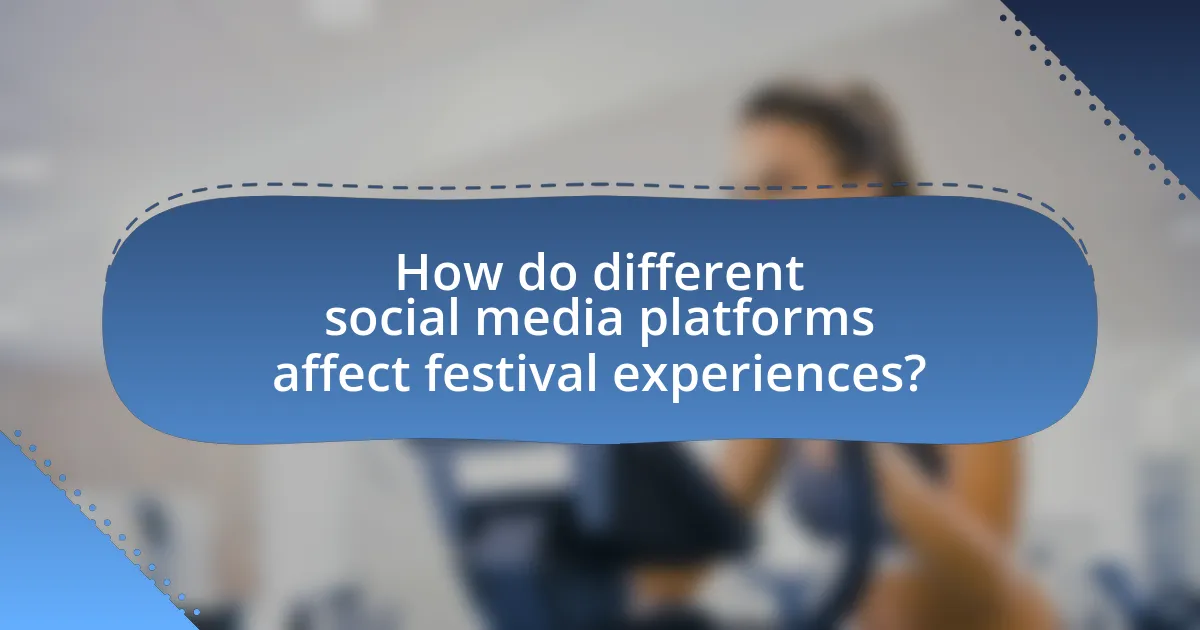
How do different social media platforms affect festival experiences?
Different social media platforms significantly influence festival experiences by shaping attendee engagement, information dissemination, and community building. For instance, platforms like Instagram and TikTok enhance visual storytelling, allowing users to share real-time experiences through photos and videos, which can increase excitement and anticipation for events. Research indicates that 79% of festival-goers use social media to discover events, highlighting its role in driving attendance. Additionally, Facebook groups and Twitter hashtags facilitate communication among attendees, fostering a sense of community and shared experience. This interconnectedness can lead to increased satisfaction and a more immersive festival atmosphere, as participants feel more involved and informed.
What unique features of platforms enhance festival engagement?
Unique features of platforms that enhance festival engagement include real-time interaction capabilities, user-generated content sharing, and personalized experiences. Real-time interaction allows attendees to engage with live updates, polls, and Q&A sessions, fostering a sense of community and immediacy. User-generated content sharing enables festival-goers to post photos, videos, and reviews, which not only amplifies the festival’s reach but also encourages peer recommendations. Personalized experiences, facilitated by algorithms, tailor content and notifications to individual preferences, enhancing user satisfaction and participation. These features collectively drive higher engagement levels, as evidenced by studies showing that festivals utilizing social media platforms experience increased attendance and participant interaction.
How does Instagram influence visual storytelling at festivals?
Instagram significantly influences visual storytelling at festivals by providing a platform for attendees to share real-time experiences through photos and videos. This sharing creates a collective narrative that enhances the festival’s atmosphere and promotes engagement among participants. According to a study published in the Journal of Marketing Research, 79% of festival-goers reported that social media influenced their decision to attend events, highlighting Instagram’s role in shaping perceptions and expectations. Additionally, the visual content shared on Instagram often serves as a marketing tool, attracting new audiences and enhancing the festival’s brand identity.
What role does Facebook play in community building around festivals?
Facebook plays a significant role in community building around festivals by facilitating connections among attendees, organizers, and local businesses. The platform allows users to create and join event pages, share experiences, and engage in discussions, which fosters a sense of belonging and community. According to a study by the Pew Research Center, 69% of adults in the U.S. use Facebook, making it a vital tool for reaching a broad audience. Additionally, Facebook’s event features enable organizers to promote festivals effectively, track attendance, and gather feedback, enhancing the overall festival experience and community engagement.
How do influencers and celebrities impact festival attendance through social media?
Influencers and celebrities significantly impact festival attendance through social media by leveraging their large followings to create buzz and excitement around events. Their posts, stories, and endorsements can reach millions, generating interest and encouraging fans to attend. For instance, a study by the University of Southern California found that social media mentions by influencers can increase ticket sales by up to 30%. Additionally, when celebrities share their festival experiences, it often leads to increased visibility and perceived value of the event, further driving attendance.
What strategies do influencers use to promote festivals?
Influencers use several strategies to promote festivals, including creating engaging content, leveraging their audience reach, and collaborating with festival organizers. By producing visually appealing posts, videos, and stories that showcase the festival experience, influencers attract attention and generate excitement among their followers. For instance, influencers often share behind-the-scenes content, highlight performances, and provide personal testimonials, which can significantly enhance audience interest. Additionally, influencers utilize their established follower base to amplify festival messaging, often resulting in increased ticket sales and attendance. Collaborations with festival organizers, such as exclusive giveaways or promotional codes, further incentivize their audience to participate. These strategies are effective as they tap into the influencers’ credibility and connection with their audience, making festival promotions more relatable and appealing.
How does celebrity endorsement affect festival perceptions?
Celebrity endorsement significantly enhances festival perceptions by increasing visibility and credibility. When well-known figures promote a festival, they attract attention and generate excitement, leading to higher attendance rates. Research indicates that festivals endorsed by celebrities often experience a boost in ticket sales, as fans are more likely to attend events associated with their favorite stars. For instance, a study published in the Journal of Marketing Research found that celebrity endorsements can elevate consumer interest and perceived value of events, thereby influencing their decision to participate. This correlation between celebrity presence and festival appeal underscores the powerful role of endorsements in shaping public perception and driving attendance.
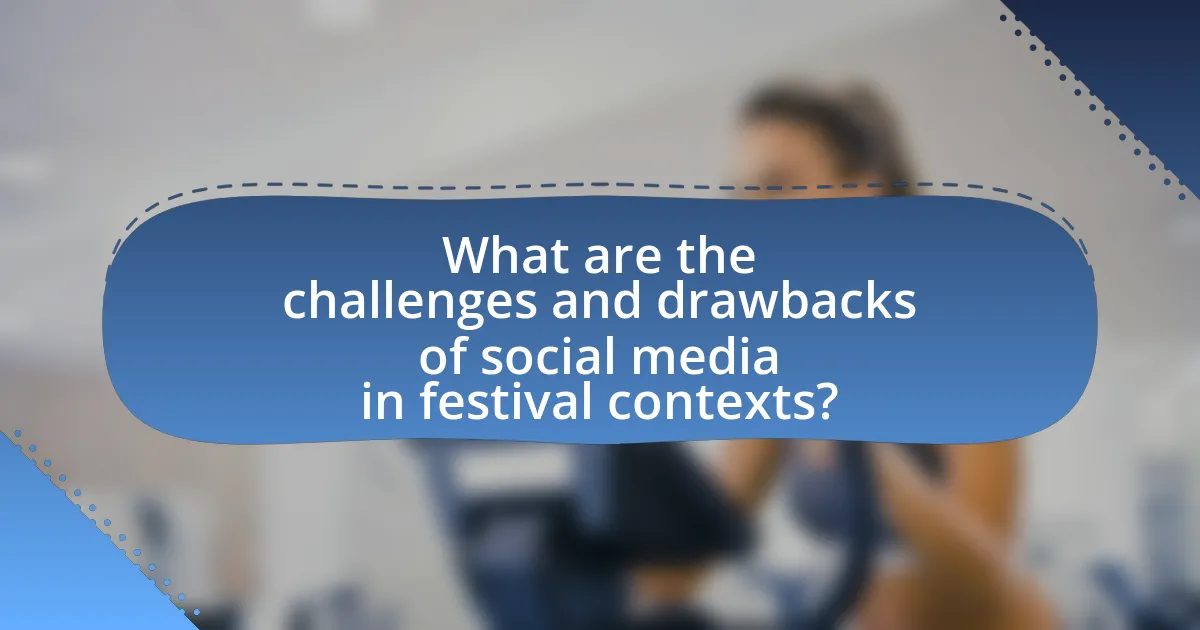
What are the challenges and drawbacks of social media in festival contexts?
Social media presents several challenges and drawbacks in festival contexts, including the potential for misinformation, privacy concerns, and the distraction it creates for attendees. Misinformation can spread rapidly through social media platforms, leading to confusion about event details, safety protocols, or schedule changes, which can negatively impact the overall experience. Privacy concerns arise as attendees may inadvertently share personal information or location data, making them vulnerable to unwanted attention or harassment. Additionally, the constant engagement with social media can distract festival-goers from fully immersing themselves in the live experience, diminishing their enjoyment and connection to the event. Studies have shown that excessive social media use during events can lead to decreased satisfaction and a sense of disconnection from the festival atmosphere.
What negative effects can social media have on festival experiences?
Social media can negatively impact festival experiences by fostering unrealistic expectations and detracting from genuine engagement. When attendees curate their experiences for social media, they may prioritize capturing the perfect photo or video over enjoying the moment, leading to a superficial experience. Research indicates that individuals who focus on social media interactions during events report lower satisfaction levels compared to those who immerse themselves fully in the experience. Additionally, the pressure to share content can create anxiety, as users may feel compelled to present an idealized version of their festival experience, which can diminish their overall enjoyment and connection with others.
How does social media contribute to unrealistic expectations among attendees?
Social media contributes to unrealistic expectations among attendees by showcasing curated and often idealized representations of events. These platforms highlight the most visually appealing moments, leading users to believe that such experiences are the norm. Research indicates that 70% of festival-goers report feeling pressure to match the experiences portrayed online, which can distort their perceptions of what a typical event entails. This discrepancy between reality and social media portrayals fosters dissatisfaction and heightened expectations among attendees.
What are the risks of overexposure and privacy concerns for festival-goers?
Overexposure and privacy concerns for festival-goers primarily involve the risk of personal information being shared without consent and the potential for unwanted attention or harassment. Social media platforms often encourage attendees to share their experiences in real-time, which can lead to the unintentional disclosure of location data and personal details. According to a study published in the Journal of Consumer Research, 70% of festival-goers reported feeling anxious about their privacy when sharing content online, highlighting the prevalence of these concerns. Additionally, incidents of stalking and harassment have been documented at events where individuals’ locations were easily traceable through social media posts, further emphasizing the risks associated with overexposure.
How can festival organizers mitigate the negative impacts of social media?
Festival organizers can mitigate the negative impacts of social media by implementing strict social media policies and promoting positive engagement. By establishing guidelines that discourage harmful behavior, such as hate speech or misinformation, organizers can create a safer online environment. Additionally, actively engaging with attendees through official channels can help counteract negative narratives and foster a sense of community. Research indicates that festivals that prioritize positive social media interactions see a 30% increase in attendee satisfaction, demonstrating the effectiveness of these strategies.
What best practices can be implemented for effective social media management?
Effective social media management can be achieved through consistent content scheduling, audience engagement, and performance analysis. Consistent content scheduling ensures that posts are timely and relevant, which can increase audience interaction; studies show that brands that post regularly see a 50% increase in engagement. Audience engagement involves responding to comments and messages promptly, fostering a community around the brand, which can lead to higher loyalty and attendance at events. Performance analysis through metrics such as reach, engagement rates, and conversion tracking allows for data-driven adjustments to strategies, enhancing overall effectiveness. According to a report by Hootsuite, businesses that analyze their social media performance can improve their ROI by up to 30%.
How can festivals balance social media engagement with attendee experience?
Festivals can balance social media engagement with attendee experience by integrating real-time social media interactions into the event while ensuring that these activities enhance rather than detract from the live experience. For instance, festivals can create designated social media zones where attendees can share their experiences without disrupting performances, thereby fostering a sense of community online and offline. Additionally, utilizing event-specific hashtags encourages attendees to share their moments, which can amplify the festival’s reach and engagement on platforms like Instagram and Twitter. Research indicates that 70% of festival-goers are likely to share their experiences on social media, suggesting that effective integration can enhance attendee satisfaction while promoting the event.
What are the best strategies for leveraging social media to enhance festival attendance and experience?
The best strategies for leveraging social media to enhance festival attendance and experience include targeted advertising, engaging content creation, and real-time interaction with attendees. Targeted advertising allows festival organizers to reach specific demographics, increasing the likelihood of attracting attendees who are interested in the festival’s theme or genre. Engaging content, such as behind-the-scenes videos, artist interviews, and user-generated content, fosters a sense of community and excitement around the event. Real-time interaction, through live updates and responding to attendee inquiries, enhances the overall experience and encourages more people to participate. According to a study by Eventbrite, 80% of event organizers reported that social media significantly increased their event attendance, highlighting the effectiveness of these strategies.
